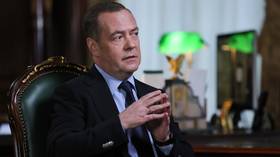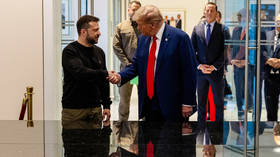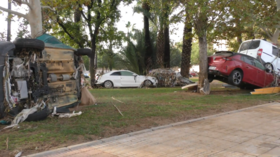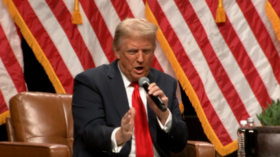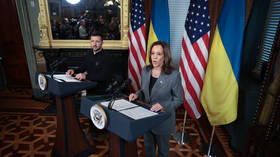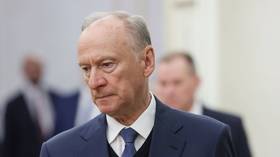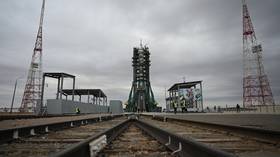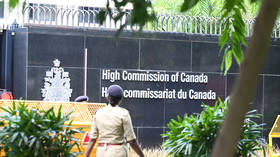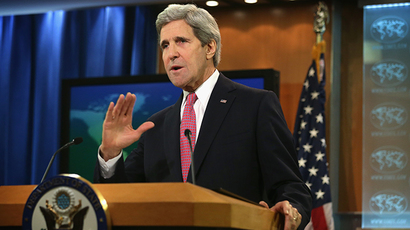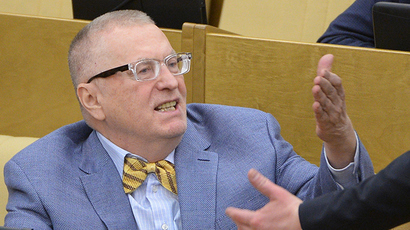Merkel: Russia to face massive damage if no progress made on Ukraine
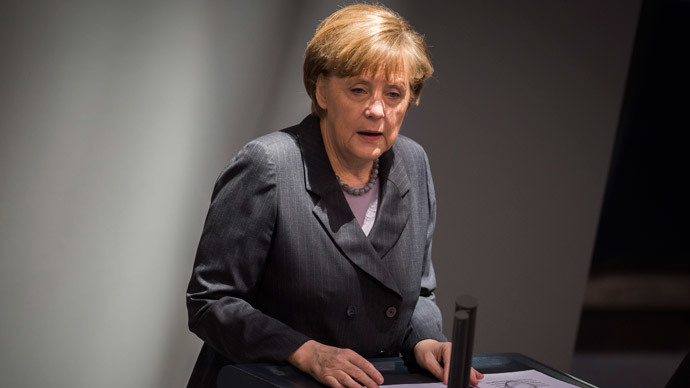
Germany’s Chancellor Angela Merkel has warned that Russia risks “massive political and economic consequences” if it sticks to its position on Ukraine. On behalf of her EU and Western counterparts, she said they support imposing sanctions.
"We would not only see it, also as neighbors of Russia, as a threat. And it would not only change the European Union's relationship with Russia," Angela Merkel said. "No, this would also cause massive damage to Russia, economically and politically."
Speaking in Germany’s Reichstag on Thursday, Merkel said that EU members and other western nations, if necessary, are prepared to freeze bank accounts and impose travel restrictions on people and firms that Brussels suspects of being involved in violating Ukraine's territorial integrity.
"The territorial integrity of Ukraine cannot be called into question," Merkel told German MPs.
As Crimean leaders adopted a declaration of independence from Ukraine, they cited the situation in Kosovo.
But Merkel said it was "shameful" to compare the independence of Kosovo with the referendum in Crimea.
“And even if there had been other breaches of international law – Kosovo not being one of them – Russia's actions in Ukraine are still a breach of international law," she added.
However, critics of the European Union’s and the United States’ stance disagree, however.
“I think you can compare it, of course,” Paul Hampel, a member of the right-wing Alternative for Germany Party, told RT. “NATO interfered in Yugoslavia. Germany, for the first time since World War II, got into a war against the country. So that was the same situation. There was a strong national group – the Albanians in Kosovo – and it wanted to become independent from Serbia. Why not compare them? This is the same situation as in the Crimean peninsula.”
The sanctions Chancellor Merkel was talking about could be approved by EU foreign ministers as soon as Monday.
Later in the day, US Secretary of State John Kerry echoed Merkel’s statement, saying that Monday will be the day when Europe will take “a very serious series of steps.”
The measure will follow, if Russia refuses to enter "negotiations that achieve results." So far, Merkel said, she had failed to persuade Russia’s President Vladimir Putin to negotiate via a "contact group." Last weekend Merkel and Putin had a phone call, during which she offered to form an international contact group. Its aim would be to find a political way to end the conflict in Ukraine.
Russia has repeatedly said it considers the referendum and actions of Crimean authorities reasonable and legal. This week, Russia’s Foreign Ministry said in a statement that Moscow would respect the results of the referendum.
The US, which also denounced Russia’s position on Ukraine, has already passed a resolution imposing sanctions against Russia, including visa restrictions against anyone “who threatens the sovereignty” of Ukraine.
Economic talks with Russia on hold
On Thursday, the Paris-based Organization for Economic Cooperation and Development (OECD) announced that it had postponed all activities related to Russia's accession to the organization. The decision came on request from its 34 members, which include such economic heavyweights as the US, Germany, France and Japan.
Instead, the OECD is going to strengthen cooperation with Ukraine to help it get through "public policy challenges it faces."
It has been seven years since Russia was originally invited to join the OECD, but the accession process has been way more difficult than for other member states. The offer to join came from the OECD more than 10 years after Russia made its official request in 1996. It was four years after it started cooperating with the organization in 1992.
In general, the OECD sees Russia’s presence as a "win-win endeavor" that would help the country modernize its economy, Secretary General Ángel Gurria said in June 2013.
Despite the OECD’s decision, Russia says it is going to continue working on agreements with the OECD.
“Unfortunately, the OECD took a political decision to suspend the procedure of Russia’s accession. There is no doubt that this fact will have an impact on the rates of the accession,” a Russian government official told Itar-Tass.
Russia to fight back
Russia, meanwhile, said it would retaliate with counter-sanctions if the EU and US impose economic measures.
Economic Development Minister Aleksey Ulyukayev, said Russia will fight back against any sanctions from the West.
Speaking to the Russia-24 TV channel on Thursday, Economic Development Minister Aleksey Ulyukaev said: "We need to bravely go ahead, first with our oil and gas companies.”
European leaders are set to meet next Thursday to discuss action affecting trade with Russia.
However, lessening economic ties with Russia may hit the EU just as bad.
Germany, particularly, gets over one-third of its gas and oil from Russia. Russia is Europe’s biggest customer, and the $13 trillion economy would suffer, should the restrictions be imposed.
"To be absolutely clear, none of us want it to come to such measures but we are all ready and determined to if they are unavoidable," Merkel said.
The warning from Germany comes three days before Crimea holds its referendum slated for March, 16. On Saturday, the republic is set to decide its future: either it stays with Ukraine or joins Russia.
However, the EU and the US consider the referendum illegal as it violates “the Ukrainian constitution and international law.”


